About this course
This bespoke programme prepares current and future media practitioners for work within Audio and Video Forensics utilising state-of-the-art methods and technology.
- If you want to apply your experience, knowledge and training to develop audio-visual skills to the standards required to help fight crime in the digital age, this is the course for you.
- The course will help you apply and translate your current allied skills qualifications and experience to enhance your employability in the new emerging industries of Audio and Video Forensics
- This bespoke course has been specially developed and designed in partnership with Merseyside Police and to help all current and future Digital Media practitioners meet the exacting standards of the justice industry. By using the same tools, techniques and best practice developed in the field and by incorporating all the legal standards and guidelines that govern the use of the various forms of digital media as evidence in investigation processes, the course is specifically designed to help current and future practitioners drive forward the quality and impact of their work in the field
- On completion of the course, you will emerge well prepared to develop your career in these areas of study
- PgDip (18 months) and PgCert (9 months) awards are also available
The Audio and Video Forensics Masters is ideal for those who have a strong interest in or are a current serving practitioner in:
- Audio and video processing
- Signal processing
- Modern CSI techniques
- Media forensics investigation
- Evidence analysis
The processes and techniques taught across this multi-level award part-time course are fully integrated and complimentary and have been developed in partnership with Merseyside Police. The modules are specifically designed to help you convert your current related qualifications and/or skills into high value specialisms that can serve the many industries that now require qualified informed audio and video forensic expertise.
The Audio and Video (A/V) Forensics modules equip you for developing or enhancing your career working with / for the police. However, as a modern digital forensic provider; you will, thanks to the Forensic Standards module, equip yourself with skills and knowledge that are equally applicable for work with the new professional private investigative services operating in this ever-expanding industry. Each module in the course is specifically designed to build and broaden the skillset you may have already built up in your current role or developed in allied areas of study to the professional disciplines of A/V Forensics.
After completion of this course, you will not only be suitably equipped to operate within the proposed ISO frameworks of Modern Digital Forensic Services but fully prepared to utilise their skills for enhanced employability in specialist areas of the modern justice industry.
Course modules
Discover the building blocks of your programme
Further guidance on modules
Modules are designated core or optional in accordance with professional body requirements, as applicable, and LJMU’s Academic Framework Regulations. Whilst you are required to study core modules, optional modules provide you with an element of choice. Their availability may vary and will be subject to meeting minimum student numbers.
Where changes to modules are necessary these will be communicated as appropriate.
Core modules
MSc Dissertation
60 credits
60 credits
This project module will provide you with the opportunity to develop your own deep/thorough investigation, undertake high quality academic research and demonstrate critical evaluation of your results.
Audio Forensics
20 credits
20 credits
This module will provide students with a thorough understanding of the relevant theory, skills, processes and procedures pertinent to their current /potential role as an Audio Technician and prepare them for a career as an Audio Forensic Specialist. The focus will be on many common real-life situations although there may be scope to further specialise in specific areas of the field.
CCTV and Video Forensics
20 credits
20 credits
This module will provide students with a thorough understanding of the relevant theory, skills, processes and procedures pertinent to their potential role as a CCTV Video Forensic Specialist. The focus will be on many common real-life situations although there may be scope to further specialise in specific areas of the field.
Forensic Standards, Regulations and Procedures
10 credits
10 credits
The module complements the technical and practical competencies of the other modules on the programme by providing the student with knowledge and understanding of the rules, regulations, standards and responsibilities of practitioners in the delivery of Audio and Video evidence in support of investigations.
Media Formats
10 credits
10 credits
In 150 years or so of recorded media there has been a plethora of ingenious ways of recording and storing Sound and Vision. Each decade brought its own advances in methodology and techniques. Consequently, new technologies for recording, storage and playback needed to be developed, perfected, marketed and accepted. This module introduces the student to many of the formats that have been used to store and distribute media and explains the ways modern digital techniques can transfer, store, preserve and interrogate their often-unique content to the very highest standards.
Research Skills
10 credits
10 credits
This module is important as it sets the groundwork for the completion of the MSc project. The module provides grounding in the skill required to formulate a project plan, design experiments, mitigate against uncertainties and deliver a comprehensive description of the results.
Advanced Audio Forensics
20 credits
20 credits
This module builds on the Basic introductory knowledge accumulated in previous modules and will provide students with a thorough understanding of the advanced practical theory, skills, processes and procedures pertinent to their current /potential role as Audio Forensic Specialist. The focus will be on many common real-life situations although there may be scope to further specialise in specific areas of the field. The Syllabus involves applying the Audio Forensic process chain appropriately with a keen awareness of the risks and implications associated with the standards and processes required for each procedure. The training is completed to a level of competence where the student is able to defend materials in court.
Advanced Video Forensics
20 credits
20 credits
This module builds on the Basic introductory knowledge accumulated in previous modules and will provide students with a thorough understanding of the advanced practical theory, skills, processes and procedures pertinent to their current /potential role as Video Forensic Specialist. The focus will be on many common real-life situations although there may be scope to further specialise in specific areas of the field. The Syllabus involves applying the Video Forensic process chain appropriately with a keen awareness of the risks and implications associated with the standards and processes required for each procedure. The training is completed to a level of competence where the student is able to defend materials in court.
Artificial Intelligence, Deepfakes and the Future
10 credits
10 credits
Artificial Intelligence is becoming a leading part of legitimate audio and video creation, as well as a significant player in forensic work. It is also being used for nonlegitimate purposes to produce fake and deepfake audio and video. This module will consider what constitutes Artificial Intelligence, and how it can be used for legal and illegal activities. Furthermore, time will be spent considering some of the advantages and disadvantages of utilising AI methodologies, and related ethical issues.
Your Learning Experience
An insight into teaching on your course
Study hours
Teaching contact is approximately five hours per week in semester one and two.
Self-study would bring the total study time to 20 hours per week.
Teaching methods
Teaching within modules is normally through online sessions delivering core knowledge and underpinning theory which is reinforced by the use of tutorials and practice sessions. During the practice sessions, a student-centred approach is normally taken, aimed at encouraging students to learn by doing.
Applied learning
Learning is heavily focused on applied learning related to the work many of the intended applicants will do every day. The assessment philosophy is 'learn by doing'.
How learning is monitored on your programme
To cater for the wide-ranging content of our courses and the varied learning preferences of our students, we offer a range of assessment methods on each programme.
Where you will study
What you can expect from your School
The specialist rooms include:
- Broadcast Studio (TV & Radio) (534)
- Studio Gallery (532)
- Media Computing Suite MAC computers (5.29a)
- Radio Room (5.29b)
- Recording Studio (5.29c)
- Sound Booth (512)
The department has a range of subject specific software for audio and video editing & production, including:
- Amped5
- Amped Authenticate
- Izotope RX
- Adobe Suite
- ProTools Premiere
- Pro Logic
Course tutors

Colin Robinson
- Programme Leader
The opportunity to work with people who will be using their training with us to make such a positive impact on our lives is always an exciting prospect. But knowing that the skills and disciplines being taught here will be helping support efficient and effective crime fighting is priceless
The opportunity to work with people who will be using their training with us to make such a positive impact on our lives is always an exciting prospect. But knowing that the skills and disciplines being taught here will be helping support efficient and effective crime fighting is priceless
Colin Robinson brings decades of professional audio and related media expertise, with 12 years hands-on teaching of Broadcasting, Acoustics, Audio Restoration and Audio and Video Forensics to his role as programme leader to this new one of a kind MSc. Always looking for new and exciting ways to develop materials and methods to enhance the learning process, he has built an impressive portfolio of student focused education initiatives, counting Sir David Attenborough, Sir Ken Robinson, Steve Backshall and The BBC Listening Project amongst his high-profile collaborators. He now devotes his time to research and educating with the new exciting digital tools and disciplines that support forensic investigations.
Career paths
Further your career prospects
LJMU has an excellent employability record with 96% (HESA 2018) of our postgraduates in work or further study six months after graduation. Our applied learning techniques and strong industry connections ensure our students are fully prepared for the workplace on graduation and understand how to apply their knowledge in a real world context.
Fees and funding
Tuition Fees:
- Home fee:
- £4,960
- Home part-time per year:
- £1,325
- Home part-time per year:
- £4,960
Fees
The fees quoted at the top of this page cover registration, tuition, supervision, assessment and examinations as well as:
- library membership with access to printed, multimedia and digital resources
- access to programme-appropriate software
- library and student IT support
- free on-campus wifi via eduroam
Additional costs
Although not all of the following are compulsory/relevant, you should keep in mind the costs of:
- accommodation and living expenditure
- books (should you wish to have your own copies)
- printing, photocopying and stationery
- PC/laptop (should you prefer to purchase your own for independent study and online learning activities)
- mobile phone/tablet (to access online services)
- field trips (travel and activity costs)
- placements (travel expenses and living costs)
- student visas (international students only)
- study abroad opportunities (travel costs, accommodation, visas and immunisations)
- academic conferences (travel costs)
- professional-body membership
- graduation (gown hire etc)
Funding
There are many ways to fund postgraduate study for home and international students. From loans to International Scholarships and subject-specific funding, you’ll find all of the information you need on our specialist postgraduate funding pages.
Please be aware that the UK’s departure from the EU may affect your tuition fees. Learn more about your fee status and which tuition fees are relevant to you.
Please note that over the 27 month duration of this part-time course, the first year costs £4960, the second year costs £4960, and the final three months cost £1325.
Entry requirements
You will need:
Qualification requirements
Undergraduate degree
- A Class 2.2 honours degree or above in Video Production, Audio Video Technology, Sound Technology, or a related discipline.
or
- A Class 2.2 honours degree or above in Forensic Science, or Mathematics or a physical science, together with experience in a relevant field.
or
- A degree with industrial experience or relevant postgraduate experience.
or
Other qualifications or experience deemed to be equivalent to the above. In particular, mature students must provide evidence of adequate educational and/or industrial experience to assure a reasonable chance of success on the award programme.
How to apply
Securing your place at LJMU
To apply for this programme, you are required to complete an LJMU online application form. You will need to provide details of previous qualifications and a personal statement outlining why you wish to study this programme.
Your university life
From accommodation and academic support to clubs and societies. Find out what LJMU has to offer.
Talk to our students
Connect with a current LJMU student for advice and guidance on university life, courses and more.
See what our students are saying
At LJMU we want you to know you’re making the right choice by studying with us. You can see what our students are saying about their experience with us through their reviews on the following websites:
Related Links
News and views
Browse through the latest news and stories from the university


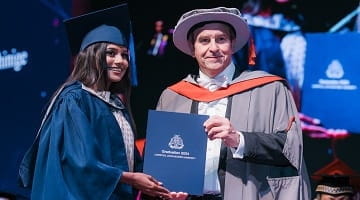
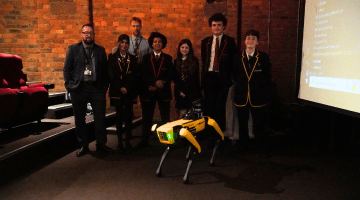
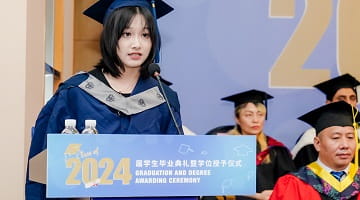

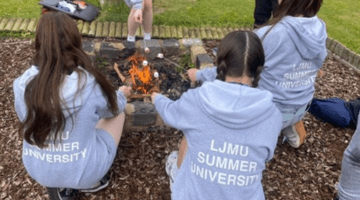

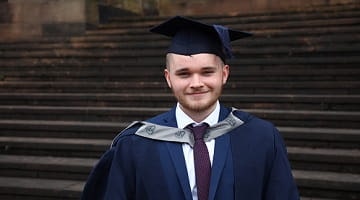
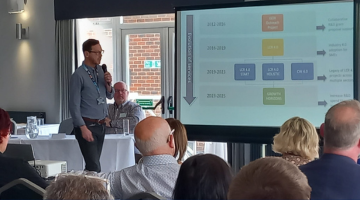
The University reserves the right to withdraw or make alterations to a course and facilities if necessary; this may be because such changes are deemed to be beneficial to students, are minor in nature and unlikely to impact negatively upon students or become necessary due to circumstances beyond the control of the University. Where this does happen, the University operates a policy of consultation, advice and support to all enrolled students affected by the proposed change to their course or module.









